Myxomatous Mitral Valve Degeneration in Dogs
The most common cause of a heart murmur in dogs is a disease called Canine myxomatous mitral valve degeneration (MMVD). It primarily affects older, small to medium sized dogs, however, any dog can be affected.
What is Myxomatous Mitral Valve Degeneration (MMVD)?
To understand MMVD, we first need to understand what causes a heart murmur in dogs. Blood should only travel in one direction through the heart before getting pumped around the body. The heart has four ‘chambers’ called the right atrium, right ventricle, left atrium, and left ventricle, with a ‘one-way door’ (or valve) to enter each chamber. The mitral valve is the ‘one-way door’ between the left atrium and the left ventricle.
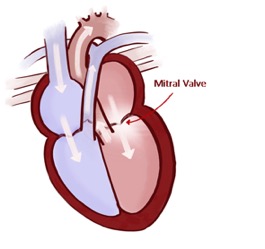
Image from: https://www.rvc.ac.uk/research/animals-in-research/case-studies/mitral-valve-disease-in-dogs
In MMVD, the mitral valves degenerate and become distorted or too short to form a complete seal, allowing blood to leak back into the left atrium. This abnormal backflow of blood causes the turbulence we hear as an audible heart murmur in dogs.
Over time, MMVD may lead to congestive heart failure (CHF). This happens when the heart becomes too weak to push blood in the correct direction, leading to excess fluid accumulating in the lungs and around the body.
What causes Myxomatous Mitral Valve Degeneration (MMVD)?
The causes of mitral valve disease are unclear. However, there are a number of implicated genetic factors that make MMVD a heritable cardiac disease.
While any small to medium-sized breed dog can develop MMVD, the following breeds are considered to be at a higher risk:
- Cavalier King Charles Spaniel
- Cocker Spaniel
- Dachshunds
- Chihuahua
- Miniature & Toy Poodles
- Miniature Schnauzer
- Maltese
How is Myxomatous Mitral Valve Degeneration (MMVD) diagnosed?
If your vet detects a heart murmur via auscultation on a physical exam, further tests will be recommended to investigate and diagnose the cause of the heart murmur.
- Echocardiogram (ultrasound of the heart) is the most commonly recommended diagnostic test. This ultrasound is usually performed by an experienced operator, usually a specialist (or cardiologist) and is extremely valuable as it provides us with live images of the heart to diagnose the cause of the heart murmur. Objective measurements such as diameter of the heart chambers, thickness of the heart walls and blood pressure to the lungs, can also be attained to determine the severity or staging of the disease and inform us on the need for certain medications.
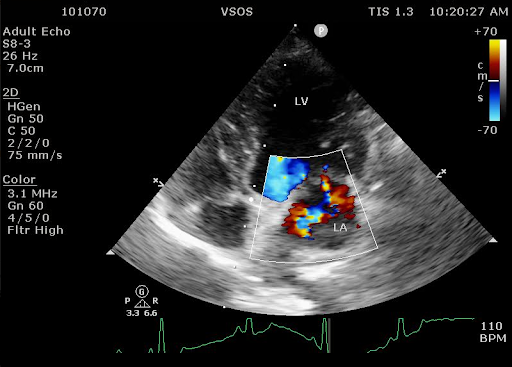
Image from echocardiogram showing backflow through the mitral valve from the left ventricle back to the left atrium.
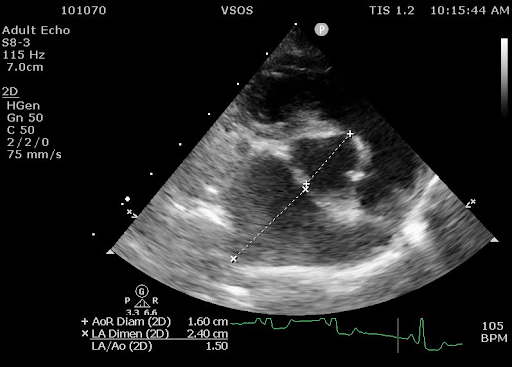
Image from echocardiogram showing measurements of the heart chambers.
- Chest radiographs (x-rays) may also be recommended as it helps us measure the size of the heart (using a vertebral heart scale) to assess for enlargement of the heart (cardiomegaly), and to examine the lungs for any fluid (pulmonary congestion) which is an indicator of progression to heart failure. Sometimes, if the heart gets too big, it can also put a lot of pressure on the windpipe.
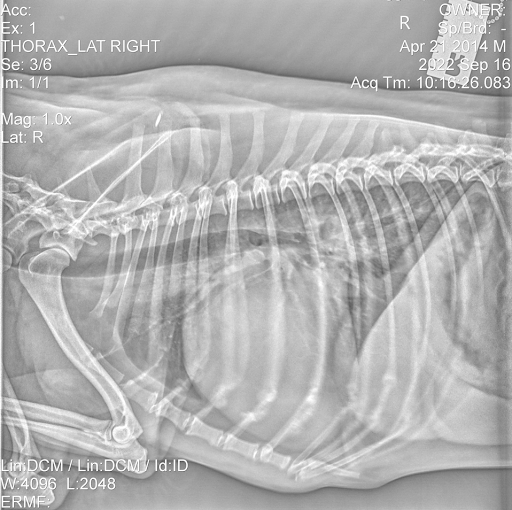
Evidence of pulmonary oedema on chest radiographs (Figure 1).
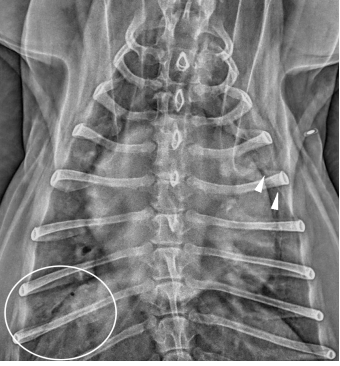
Evidence of pulmonary oedema on chest radiographs (Figure 2).
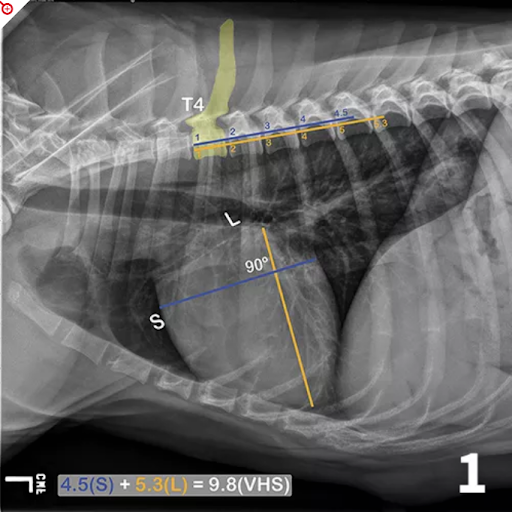
Vertebral heart scale (VHS). Image from https://www.cliniciansbrief.com/article/vertebral-heart-scale
What are the signs of congestive heart failure (CHF)?
A heart murmur due to heart disease can progress into congestive heart failure. This is a serious condition where their lungs get congested with fluid or there is excessive abdominal fluid. Clinical signs include:
- Lethargy
- Fainting or collapsing
- Coughing
- Gagging
- Trouble breathing
- Exercise intolerance
- Reduced appetite
- Swelling in the abdomen or ‘bloated’ belly
- Muscle loss
What do I do now that my dog has a heart murmur?
A heart murmur doesn’t have to be end-of-the-world news! Some heart murmurs are completely incidental in healthy hearts, while some are caused by heart disease. Early heart disease often shows no other outward clinical signs so it is important to have your dog’s heart assessed regularly at their annual checkup. If a heart murmur is noted due to underlying heart disease (e.g. MMVD), not all cases rapidly progress, but it is very important to monitor it closely and track progression. According to the American College of Veterinary Internal Medicine (ACVIM) 2019, an echocardiogram should be performed regularly, usually every 6-12 months depending on the type and severity of the heart condition. This specialist panel of cardiologists stresses the importance of monitoring the disease very closely because it’s easier to slow progression of heart disease than play catch-up with congestive heart failure (CHF).
Why is it so important to repeat the echocardiogram and/or chest x-rays?
There are different stages of MMVD and how quickly one dog progresses from one stage to the next can vary quite a bit. The stage of MMVD will influence when certain medications are required based on a set of criteria.
- Stage A – Dogs at high risk of developing heart disease (e.g. Cavalier King Charles Spaniels). No disease is present yet.
- Stage B1 – A murmur is heard but there are no visible signs of heart enlargement or heart failure.
- Stage B2 – A murmur is heard AND there is evidence of heart enlargement, but no signs (pre-clinical) of heart failure. Certain heart medications will need to be started at this stage. Many dogs do NOT show any outward clinical signs (e.g., coughing, lethargy, inappetence) despite progressing to this stage, so it is important to have regular echocardiograms performed to catch it early.
- Stage C – A heart murmur is heard AND there is evidence of worsening heart enlargement AND signs of heart failure are now apparent (eg. coughing, lethargy, fainting). More medication is usually required at this stage. A chest radiograph may also be recommended to assess for fluid in the lungs.
- Stage D – End-stage congestive heart failure which is not responding to treatment.
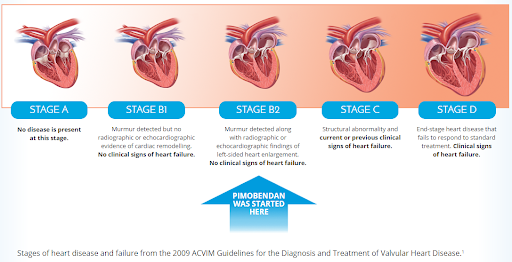
How is Myxomatous Mitral Valve Degeneration (MMVD) treated or managed?
There are different treatment plans depending on what stage of heart disease your dog is at. The medications involved in managing heart disease are aimed at making it easier for the heart to pump blood (e.g. lowering blood pressure, improving heart muscle strength) and diuretics (medications to help the body get rid of excess fluid which are especially important in dogs with signs of congestive heart failure when there is fluid congested in the lungs or in the abdomen). There is evidence that dogs commenced on medication in early (pre-clinical) stage B2 significantly extended the symptom-free period by an average of 15 months.
- Stage A and B1 do NOT require any heart medication.
- Stage B2 requires daily heart medication to slow down progression of heart disease and delay the onset of congestive heart failure
- As heart disease progresses (stage B2 and upwards), multiple medications daily may be required to help control heart failure.
What is the prognosis of dogs with Myxomatous Mitral Valve Degeneration (MMVD)?
The prognosis of newly diagnosed MMVD varies considerably. A heart murmur can be big news for a paw-parent, but the earlier the diagnosis is made, the better the prognosis is for your dog. It is very important to investigate, stage and treat a heart murmur properly because some heart murmurs due to disease can lead to rapid deterioration and congestive heart failure.
At My Vet Animal Hospital, we work closely with Specialists in Small Animal Medicine and Cardiology. We are able to organise a specialist to come to our clinic for an echocardiogram, rather than travelling to a specialist hospital. We also offer diagnostic x-rays and blood testing in-house for immediate results, and allows us to provide your dog with an accurate diagnosis in a timely manner, access to gold-standard monitoring tests and the best treatment.


